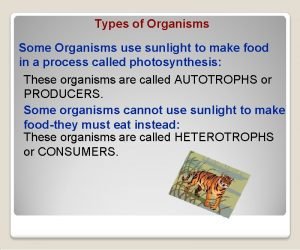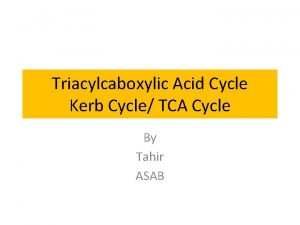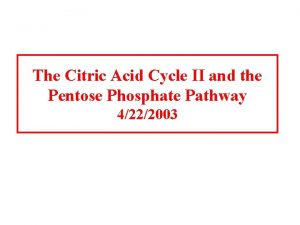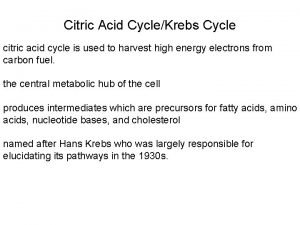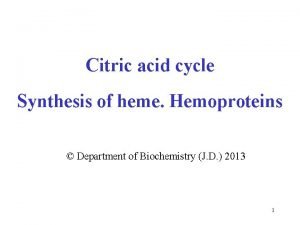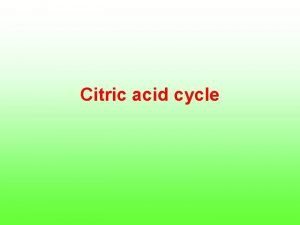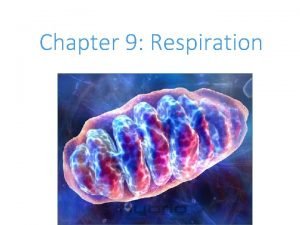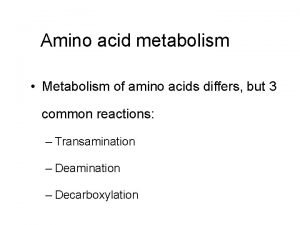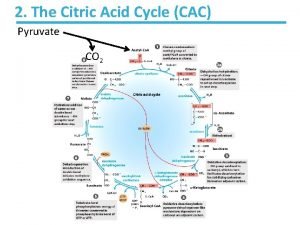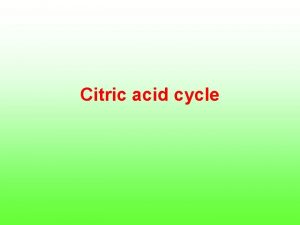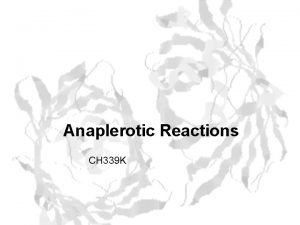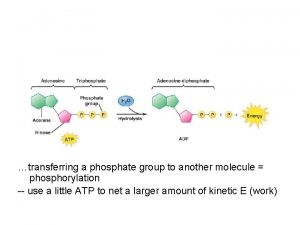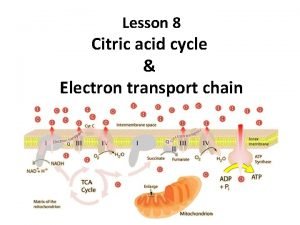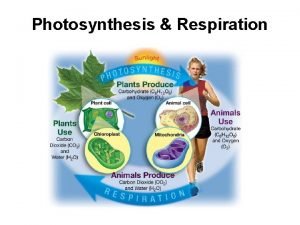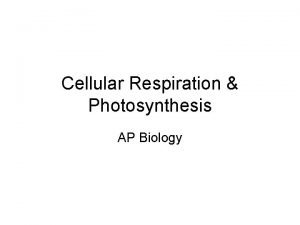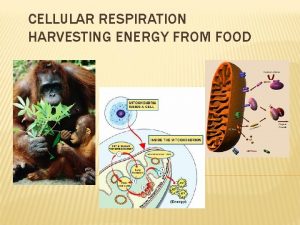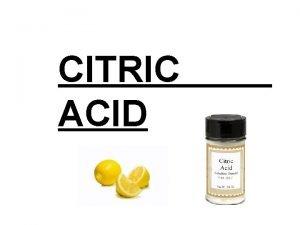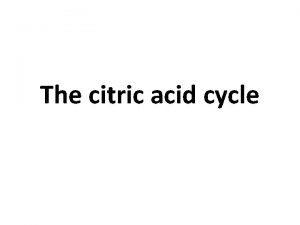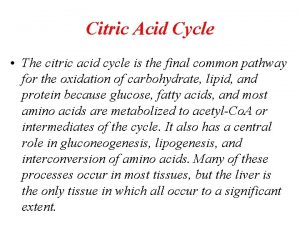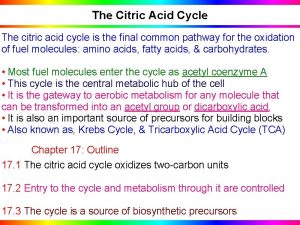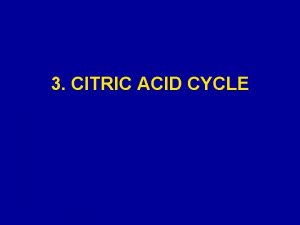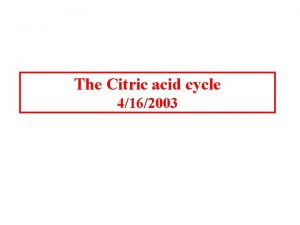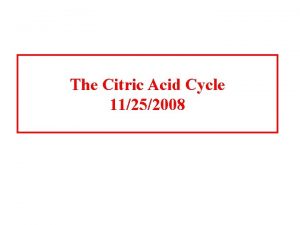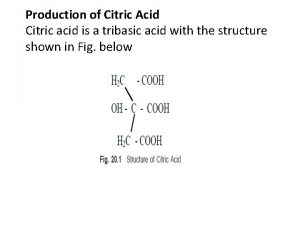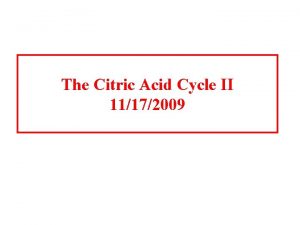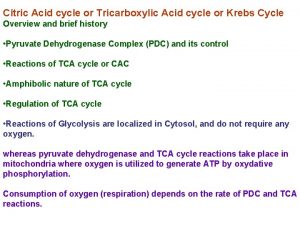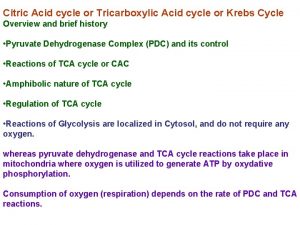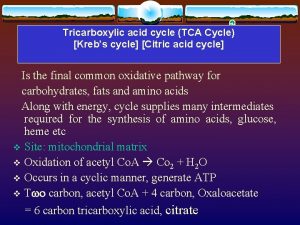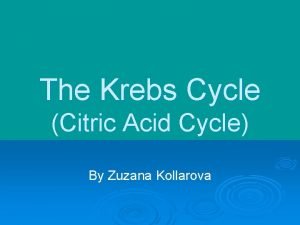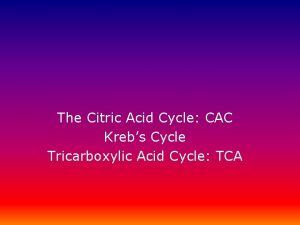Anaplerotic Reactions CH 339 K Citric Acid Cycle



















- Slides: 19

Anaplerotic Reactions CH 339 K

Citric Acid Cycle in Anabolism

Anaplerotic Reactions ana: back; up; again; re. Plhrow: I fill Anaplerotic reactions refill the pools of Krebs cycle intermediates that would otherwise become depleted.

Important Anaplerotic (Replenishing) Reactions

Pyruvate Carboxylase • Mitochondrial enzyme • Two roles • Gluconeogenesis • Anaplerosis • 4 identical subunits • Biotin cofactor

Role of Biotin in the Pyruvate Carboxylase Reaction

PEP Carboxykinase • Cytosolic enzyme active in gluconeogenesis • Mitochondrial enzyme active in anaplerosis

PEP Carboxylase • Mechanism involves pyruvate enolate • Phosphate is transferred from PEP to bicarbonate • Pyruvate enolate then attacks the carboxyphosphate anhydride carbon • Sequesters carbon in some plants

Malic Enzyme 1) Reductive carboxylation 2) Uses NADP+ as a cofactor instead of NAD+. 3) Pyruvate carboxyl reduced to hydroxyl

Transaminations • Every a-amino acid has a conjugate a-keto acid. • Amino and keto conjugates are readily interconverted.

Citric Acid Cycle in Anabolism

Gyoxylate Cycle • Critters can make fat from carbohydrates • Plants, fungi, and some bacteria can make carbohydrates from fats via acetyl-Co. A • Use a modified version of the Krebs Cycle • Plants use this to grow from stored oils in seeds • Bacteria use this to grow on simple carbon compounds when carbohydrates are unavailable • Critter exception – some nematodes in early stages can perform

The triffids that ate England were apparently quite dependent on the glyoxylate cycle to assimilate there quivering human prey…

The Glyoxylate Cycle --> gluconeogenesis


The Glyoxylate Cycle 2 Acetyl-Co. A + NAD+ + 2 H 2 O --> succinate + 2 Co. A + NADH + H+ Compare with Citric Acid Cycle Acetyl-Co. A + 3 NAD+ + FAD + GDP + Pi + 2 H 2 O --> 2 CO 2 + Co. A + 3 NADH + 3 H+ + FADH 2 + GTP

Glyoxylate Cycle Takes Place in Glyoxysomes in Plants

Connections Between Glyoxylate Cycle and Citric Acid Cycle

Isocitrate: An Intermediate Common to the Glyoxylate and Citric Acid Cycles
 Where is the citric acid cycle located in the mitochondria
Where is the citric acid cycle located in the mitochondria How is citric acid cycle regulated
How is citric acid cycle regulated Citric acid cycle overall reaction
Citric acid cycle overall reaction Inputs of the citric acid cycle
Inputs of the citric acid cycle Krebs cycle equation
Krebs cycle equation Tca cycle meaning
Tca cycle meaning Where does the citric acid cycle occur
Where does the citric acid cycle occur Catabolism of amino acids
Catabolism of amino acids Tca cycle net products
Tca cycle net products Glycolysis overall reaction
Glycolysis overall reaction Definition of citric acid cycle
Definition of citric acid cycle Citric acid cycle
Citric acid cycle Citric acid cycle
Citric acid cycle Krebs cycle steps
Krebs cycle steps Diagram cellular respiration
Diagram cellular respiration Photosynthesis citric acid cycle
Photosynthesis citric acid cycle Citric acid cycle and electron transport chain
Citric acid cycle and electron transport chain Photosynthesis citric acid cycle
Photosynthesis citric acid cycle 8883396469
8883396469 Lesson 8 homework practice quadratic functions
Lesson 8 homework practice quadratic functions
